#but it means so much more
Text
i just went through my dads old nintendo ds camera and voice notes (which i would go on all the time) and i am SOBBING.
i was 3/4 years old in most of the photos and i would just bring this ds with me everywhere i would go taking photos of my day and i can’t even cope
#there’s photos of me and my parents on there and i look so happy and i’m just having fun#and i cant take it i just broke down#it sounds so stupid because it’s just a ds camera roll but i have NEVER seen some of these photos before.#alèssi says things#im so emotional#i’ve always been an extremely quiet person and instead of talking to people i would ALWAYS be on this ds#i used to say bowser from mario is my imaginary friend that’s how much i loved this ds 😭😂#he was there to protect me i guess#but i used to ‘save him a seat in the car’ and everything#and i’m just#i cant#there was a photo of a patch of grass probably at my brothers rugby match#and i LOST IT#over a patch of grass#but it means so much more
4 notes
·
View notes
Text
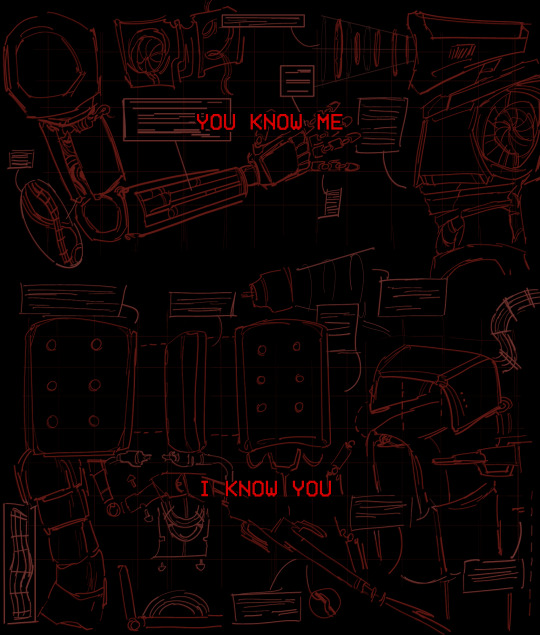

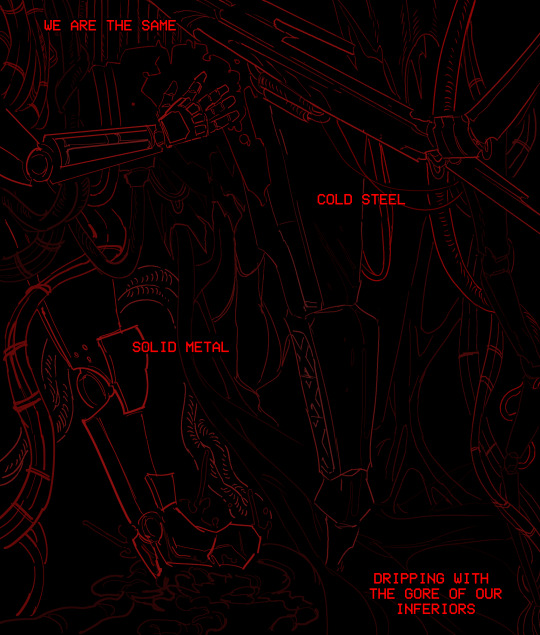
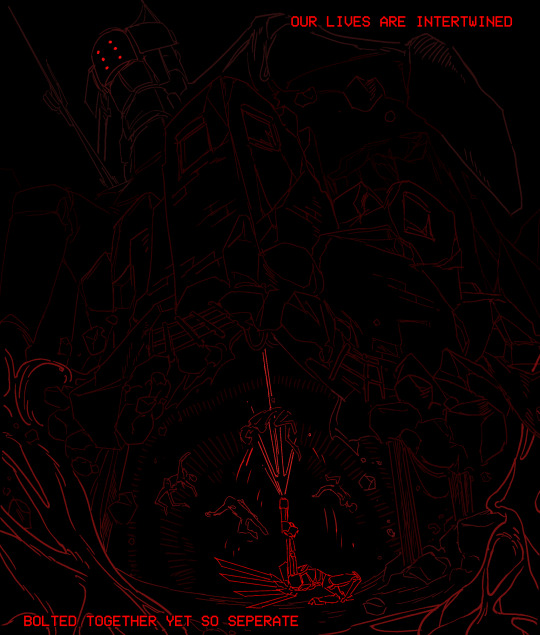
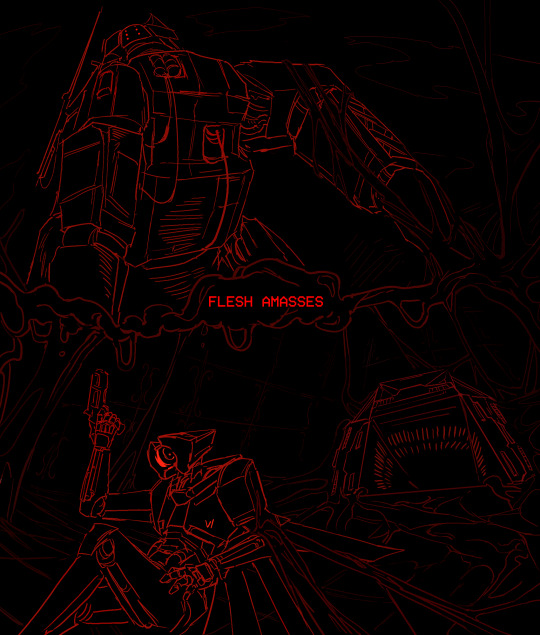


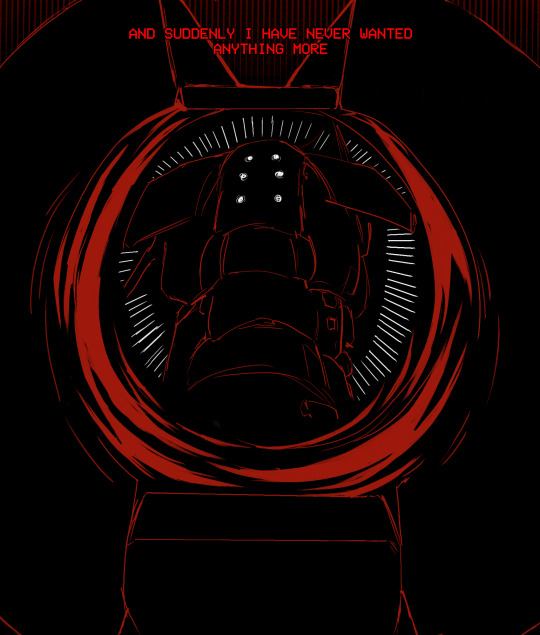
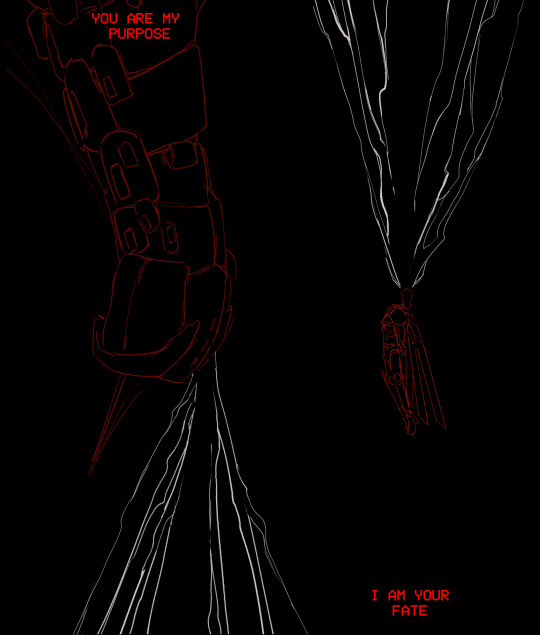
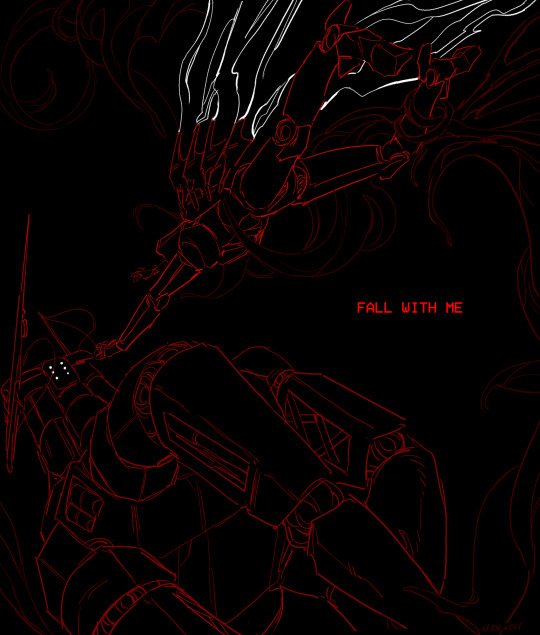
I WAS MADE FOR YOU // YOU WERE MADE FOR ME
#ultrakill#earthmover#1000-THR#v1#violence layer#god. they mean so much to me#what the FUCK is up with the violence layer#theres so much shit. its so good. ohhhmyyy gggggg#their dynamic is insane to me. i cant just make one piece#gen art#object loving object...#weapon4weapon.........#take this comic as you will though#it is meant to be taken both seriously and thematically while also having that. little sprinkle of oh. doomed yaoi/yuri. you get it#by 'i have never wanted anything more' it was mainly to describe v1s instict to take the earthmover down and kill it-#but it can mean whatever you want it to mean
8K notes
·
View notes
Text
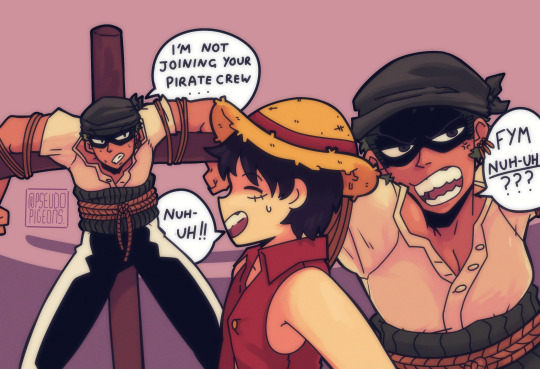

started watching the silly little pirate show
#one piece#roronoa zoro#monkey d. luffy#zolu#they mean so much to me#i wanted to get caught up to east blue by the time the live action came out#am currently on episode 91#anyways one piece oomfies let yourself be known#i need to follow more one piece artists
9K notes
·
View notes
Text
satoru physically withers and crumbles every time you return his belongings. he doesn’t know how to tell you that he can only accidentally on purpose leave his glasses on your nightstand, or his jacket on your couch, or his shirt in your laundry so many times before he loses his mind. every time you don’t take he bait, he folds into himself and wonders why you don’t love him anymore and it costs him $22.50 to hear ieiri tell him to suck it up and use his words because he literally has to buy her company (and drinks).
but when you do take the bait, when you do wear his things, satoru thinks it’s all worth it. he can’t explain why it does what it does to him. it’s a sinister kind of possession he wants to have over you, knowing you’re your own person, free to do as you please, but also knowing you’re caged in him. it’s a lovesick kind of gooeyness that melts his heart seeing you fumble with the sleeves of a sweater that’s too long for you. it’s the vision of you seeing you drowning in him—in his clothes, in his things, in him, in him, in him. he’s selfish, he wants to consume you in as many ways as possible, wants you to drown in him, would die happily knowing you were one tenth as enraptured by him as he is with you. he doesn’t know how or why or when you gained so much power over him, but he doesn’t care, he doesn’t want you to ever stop, so if he has to keep pretending to leave his clothes and bags and glasses around then so be it.
#i don’t know how to explain that satoru’s love is so. beautifully consuming#he loves and loves and loves and he doesn’t even think about it it’s mindless it’s second nature#and sometimes he stops and pulls back and gets shy about how much you mean to him and how bad he wants you#he doesn’t know why you have this power over him but he doesn’t mind it and he wants more of it all the time always#oh…. my sweet sweet lover boy#jjk x reader#jujutsu kaisen x reader#gojo x reader#satoru gojo x reader#gojo smut#gojo fluff#jjk smut#jjk fluff#jujutsu kaisen smut#jujutsu kaisen fluff#jjk imagines#jjk smau#💌.satoru
5K notes
·
View notes
Text
someone probably said this already but in spiderverse i think it's interesting how when pavitr was first introduced everyone thought something bad was gonna happen to him bc of how confident and optimistic he was. and then in the actual movie we see that something bad was supposed to happen to him (police chief dying!) but it doesn't! miles stops it! and miguel berates miles for this, says it's going to cause the universe to collapse or whatever.
there's this idea that tragedy is inherent to spidermans growth, and while it's true that some spiderpeople learn important lessons through loss, no one stops to ask, is it really necessary? yeah, maybe the chief was supposed to die. but why does spiderman have to be formed through tragedy? why do we (as heroes) have to let people die? pavitr didn't lose anyone, and he's still a good spiderman! maybe, if he doesn't suffer, he'll end up better off for it!
so while miguel is arguing for all this big picture stuff about saving the multiverse he's lost sight of what it really means to be a spiderman, he's not looking out for the real individual people. yeah it's just one person who would die, but that one person means something to someone. shrugging and saying "stuff just sucks sometimes, we can't do anything about it" is the opposite of what superheroes do. pretty obviously, miles arc is also a reflection of the struggles people face in real life, working within unequal systems, where it's easy to shrug and say "that's just the way it is" and not ask "but why does it need be this way? can't we do something about it?"
miguel is arguing that you can't have your cake and eat it too. presumably, miles and co. are going to find a way to get around that and change things for the better (and maybe that's why miles has that line about two cakes in the advisors office!)
#across the spiderverse#across the spider verse spoilers#break from my regularly scheduled trigun posting for spider posting#i'm actually kinda eh on the idea of the canon and police chiefs dying it is not my favorite plot point#but like any sane person i love spiderverse so#actually still think i like the first one more but wroaw much to think about#spiderverse#atsv#.lieii#i only watched the movie once so hopefully this is all accurate#i feel like this is all really obvious my point was like#pavitr being an example of a spiderperson who is still successful without going through all these awful things#and you think despite all this stuff about the multiverse how does he feel about the chief being saved? hes probably rly grateful right?#i mean maybe something terrible will happen to him in the next movie but. yk what im saying#.lieii txt
9K notes
·
View notes
Text
Almost forgot to post this here!
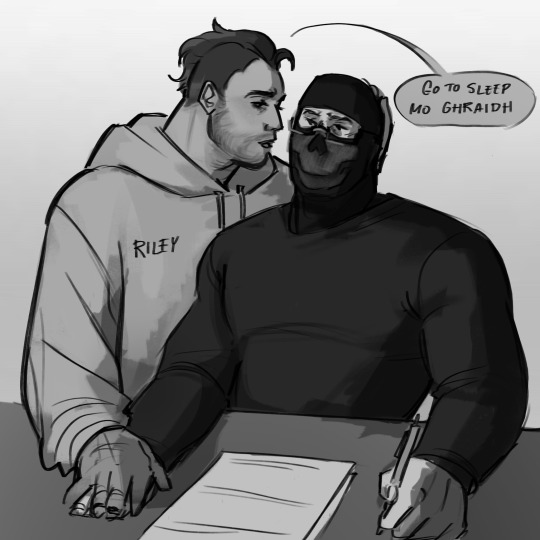
#this is one of those sketches where i don't worry too much about anatomy and poses looking perfect but more about the therapeutic properties#by therapeutic properties i mean drawing these two idiots so that i feel better at the end of my day#now onto the real tags#fanart#john soap mactavish#soap call of duty#soap cod#soapghost#myart#ghostsoap#ghoap#simon ghost riley#ghost mw2#ghost call of duty#ghost cod#cod mw2
3K notes
·
View notes
Text
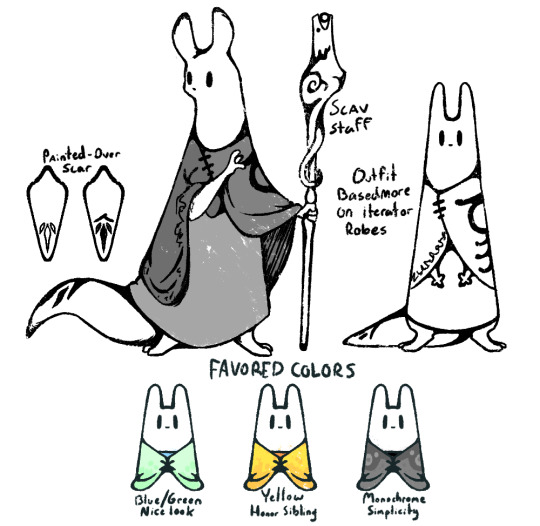

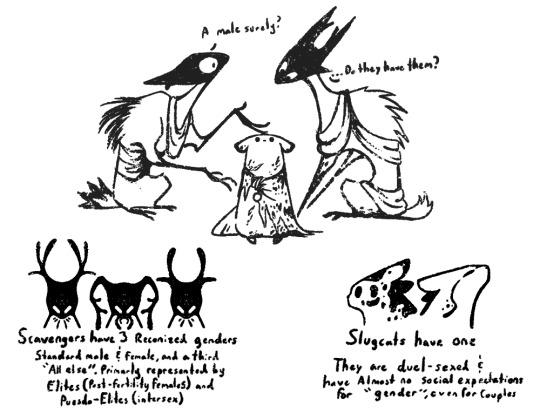
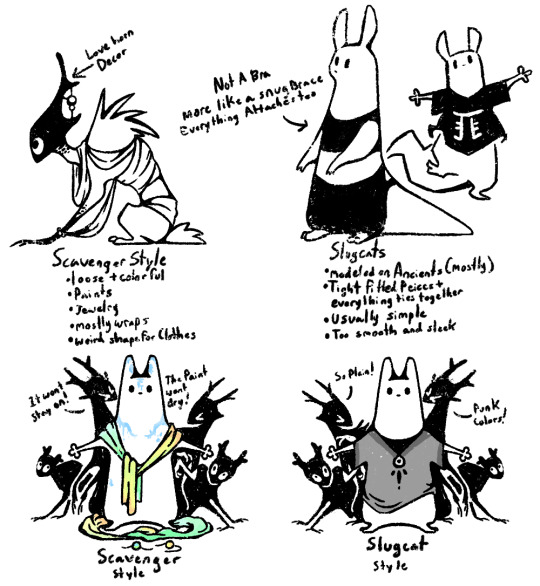
Anthro Au Survivor drafts feat. too much worldbuilding because I cant just put pants on a slugcat like a normal person & my godawful handwriting
The Survivor (Their full, scavenger-given name includes the 'The') was separated from their family while traveling between colonies and stranded in the dangerous unpopulated wilds.
Against all odds they managed to survive (and wander) far longer than they should have been able, but rather than reconnecting with their (or another) slugcat family, they instead made contact with one of the many wandering scavenger troops- But unfortunately not one that had ever met a slugcat nor had any idea what to make of a stranded one.
Regardless the group gave it their best, ended up committing to the role of slugparents, and The Survivor and their troop still consider themselves close family long after Survivor finally reconnected with their sibling. (They're a bit of a mess though, understandably)
#rain world#rw anthro#subject to change and sorry if you actually try to make sense of this#but since arti is more anti-scav and survivor is a lil 'plain' i thought mixing scavengers in them would be a fun thing to explore#with the vanilla slugcats#unfortunately it means survivor was a very confused child who is a still confused adult#Also just cause of the way this is set up I think they have reconnected with Monk at this point#making this all so much harder on myself by not just going 'yea theyre in high school they ride bikes and drive cars' instead im being weir#and theyre turning more to rw if the creatures were sentient enough to do taxes#scribbles
2K notes
·
View notes
Text
I think Deku has a bit of a mean streak, actually. he’s no Bakugou—that’s for sure—but he’s not this innocent, sweet angel baby that the media has painted him out to be. but you only catch it when you least expect it, when you’re pushing his nerves, when the stakes to everything around him are high, when he’s tired of endless sleepless nights and just—snaps.
“Oh?” you go, grin unfurling like some grinch, chin resting on your hands as you leer at him from across his expansive desk. “You’re mean.” your words are teasing, a snarl that curls your mouth up. Deku stutters, eyes going wide, jaw snapping shut in surprise as he tries to think back on how rude he just sounded.
“No, I’m not—I mean, you wouldn’t stop and I just—there’s a lot on my plate right now—and you just—you keep on—I’m not—I’m not mean.” He’s sputtering, hands all over the place, the glasses perched on the bridge of his nose falling even lower with how he jabbers on and on. it’s endearing really, to see how he tries to upkeep his image of being so kind and understanding, even though his nostrils just flared at you. and his eyebrows turned down and he gritted at you, his hands were balled into fists, his words were so nasty, so ugly, so unbecoming for Deku.
you liked it. loved it even—vowed to get him like this every single fucking second that you could.
you pick and poke at him whenever you see him, teasing him and pulling at him. pushing him around even though the hero is so much stronger than you, so much bigger. and he lets you, tries to defend himself but—that’s not what you want. you want the ugliness, the snark, the mean.
he snaps, eventually, when you least expect it. grabs you up in black whip when you go to push him against the wall for the third time in only a minute, his eyes suddenly dark, the aura of the room suddenly charged.
“That’s what I was looking for.” you whisper to him, the grin spreading your face quickly dissipating in only seconds when you become the prey. when you become the one pushed up against the wall with teeth at your neck, a hand in your underwear, bullying your hole with too thick fingers.
“Why do you want me to act like this? Be so mean to you, huh?” he sounds so frustrated with himself, with you, growling and nipping and licking when you don’t answer quick enough. but your breath is caught in your lungs because finally—finally, did you get what you wanted. it just took a little bit of pushing, you suppose.
#omg I wrote this idea down last night and couldn’t even type it up#bc I took some sleep meds and it put me out SO FUCKING QUICK????#usually I don’t lay down until like an hour and a half or two#but it was literally like 40 mins and I was DONE!!!!#but I finally wrote it :D#there’s also been so much talk of him on the dash and i am. very much so liking this#I miss him bc I don’t think about him enough#but I also think he can be. so mean. like NASTY mean when his limits are pushed enough#ohhhh my god I wont him so bad#okay gn I took more meds bc my pelvis has been in so much pain????#just the right side too??? omg AM I DYING GELP#—new treat in the streets! 🍫#deku treats! 🍬
2K notes
·
View notes
Text
just endlessly thinking about blue eye samurai.
thinking about how akemi, taigen, and mizu are if a coin had three sides or maybe just the two and mizu is the bridge of metal between them.
akemi being the ideal image for women, for the life they endure. she was simultaneously a princess, a prostitute, and a prisoner. her entire life was men making decisions for her, even the ones that had good intentions, and she believed her deepest desire was freedom. it still is, but she has been revealed to this heinous predicament of her gender, and she’s realized that to reach true freedom as a woman is to be the bird in the cage, to play nice and to earn the love of a man until he buys her a bigger cage and a bigger cage until he trusts her not to fly away. and it'll never be true freedom, but it will come with power. it'll come with the freedom of only one master rather than many.
taigen being the ideal image of a man. not all powerful, but not weak. he had a taste of what it'd be to succeed, and when it was taken from him, that easy success, he mistook it for his honor. he hunted mizu down to kill him, and instead he saved him. he saved him and saved him and he came closer to killing mizu when they were on the cliff's edge, and just when he gets to the point where he may actually fight mizu, he's tortured for information on him. he is tortured. Literally tortured within an inch of his life, enduring such a heinous violence, and he refuses to break. this man was a fight, was the torturer, and the victim of his torturing could've been his salvation from pain but he refused. mizu gave back taigen's honor but not by fighting him.
akemi wanted freedom and learned she would need power to have it.
taigen wanted power and learned that the violence that came with it was infinite and dishonorable.
and then there's mizu. mizu who wants revenge, wants acceptance. arguably the same things as them both. mizu wants acceptance, the freedom of living and the freedom to love and be loved. mizu wants revenge, which follows after violence and power, to get said acceptance. she thinks she must do both, have both, to live peacefully, and she's blatant about how she will not live without either.
she's given acceptance with the blacksmith, her "mother," her husband, but she sees the flecks of avoidance in it.
the blacksmith will not hear of her true gender. her "mother" will not acknowledge the crime of her birth. her husband can't find tolerance for the violence within her, the man of her.
and so she has to balance the woman and man of her, the ronin and the bride. taigen and akemi. and it's meeting mizu that they start to unravel their own identities.
mizu, who is both, and akemi and taigen who thought themselves one but turned out to be neither.
god.
#complexities#and comparisons#i think they are so much more than what i’ve said but just#the cinematography#and the metaphors#the underlying theme of birds#blue eye samurai#the poetry that you are#it feels like every scene was specifically crafted#like they did not make one undeliberate mark#like it all has meaning#i’m insane#mizu#taigen#akemi#mizu x akemi x taigen#the ronin and the bride
2K notes
·
View notes
Text
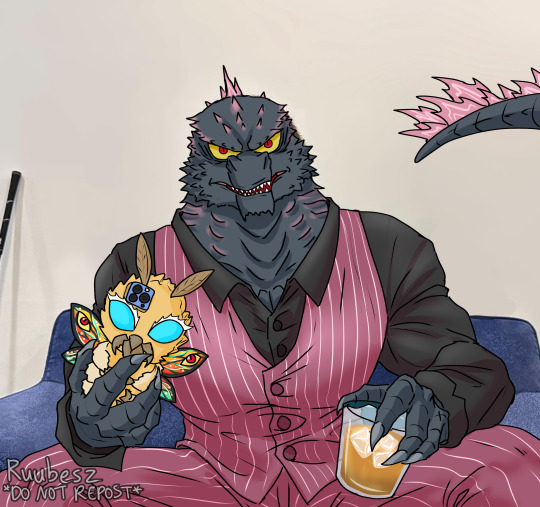
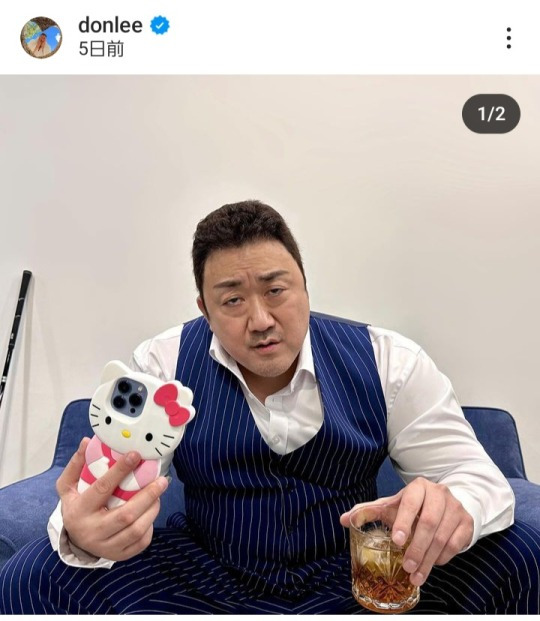
He buys and collects all the Mothra merch
He's so proud of himself!
#godzilla#godzilla x kong: the new empire#mothra#mothzilla#godzilla x mothra#he's probably no. 1 Mothra merch buyer lmao#he collected everything#he loves her so much#i mean that's how he coped when mothra died in kotm#he only had his mothra merch to keep him happy#BUT NOW THAT SHE'S BACK HE IS ECSTATIC#he missed her so much#gonna draw more mothzilla cos I NEED it#anyway don lee is so cool#he's amazing af#do not repost#my art
1K notes
·
View notes
Text
enough stories about how someone learns to truely be happy through love.
i want a story where someone is desperately seeking out love thinking it's the only way to be happy only for them to learn by the end that happiness is what they make of it and they don't need love at all to make it.
#aro#aromantic#ace#asexual#aroace#loveless aro#loveless#non-partnering#nonpartnering#non partnering#nonamorous#aplatonic#enough of amatonormative tropes in media!!! enough 'you're miserable without love' stories!!!#less “you're too focused on ambitions to make you happy that you dont let yourself fall in love”#more “you're too focused on finding love to make you happy that you wont let yourself live”#more “there is so much more to life than love and so much more that can bring your happiness if you just let yourself experience it.”#maybe I should write this story#and when i say love i mean all love. not just romantic love.#which is why i tagged aplatonic too#while i mostly see this trope in terms of romantic love i think there's something to be said about#telling stories where people are perfectly content alone too#it doesn't have to be sad or pathetic to not have friends by choice. they dont have to be a miserable person to not have friends#i think we need more variety in stories where it shows people just content in their lack of love or relationships in all shapes#not everyone wants a family not everyone wants friends not everyone wants a partner not everyone wants love#some of us are content without. that should be explored without the need to fix it.
1K notes
·
View notes
Text

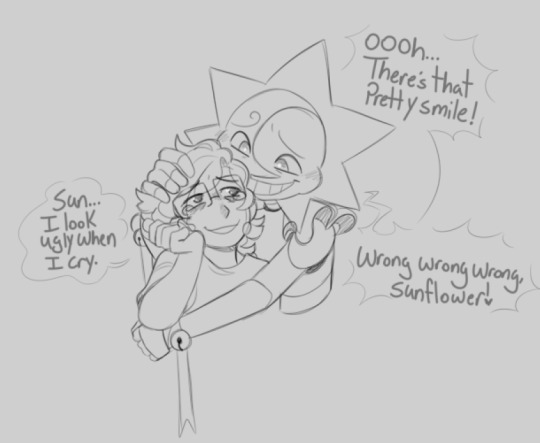
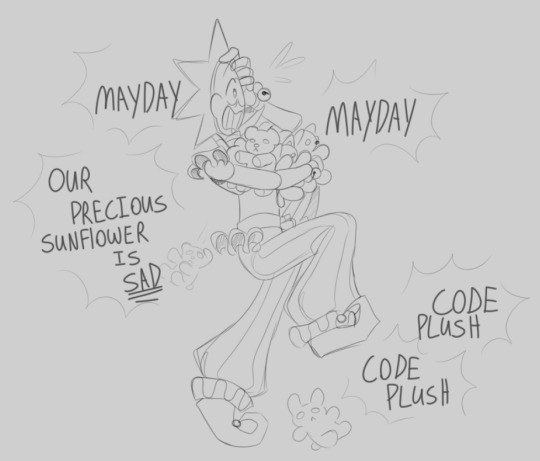
I need him to bury me in affection right now
#more dca doodles as stress relief cause I am!!! a mess rn!!!!#I mean im fine but aaa woo boy#anYWHOMST! idk why my brain is dragging sun and moon out of the depths of my mind and into the front#After not drawing them for ages I suddenly wanna give them attention again#poor fellas gotta share my attention with WH tho lmao#dca fanart#dca fandom#daycare attendant#fnaf dca#fnaf daycare attendant#fnaf security breach#fnaf sun#my art#sketches#self insert x canon#dont tell moon that sun is my favorite im sorry moon i love you too so much i promise
2K notes
·
View notes
Text
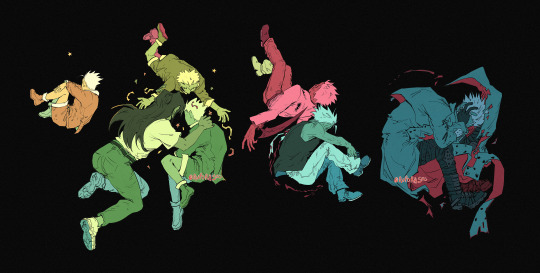


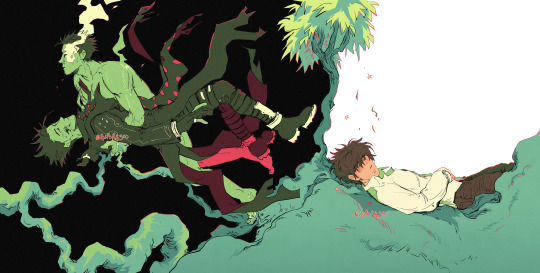
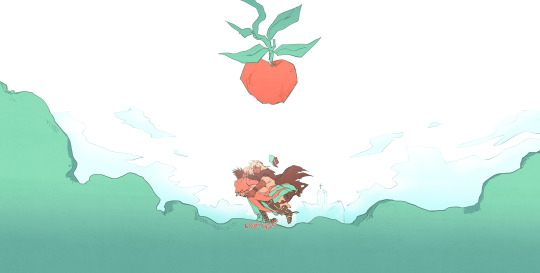
the blank ticket in your hand is just waiting to be filled in.
happy birthday vash! (ID in alt text)
#vash the stampede#trigun#trigun maximum#trigun maximum spoilers#trimax spoilers#vashwood#i actually made it... im crying... was devastated for a bit bc i thought i wouldnt had anything for vash's bday!!#but happy birthday to the twins.. vash and knives...#no matter what i was going to make a vash centric post im sorry knives... i have a comic in progress also but it was taking too long T_T#that one would celebrate both of them slightly more fairly! but anyway.#birthdays to someone like vash must not mean a whole lot. even the first one - him and knives were like oh what... cool.. i don't think the#had the chance to celebrate much after that :pensive: and vash probably spent most of his birthdays like any other day so i kind of just#wanted to celebrate him living and being alive - living for as long as he did and the people that eventually made living worth it#keep counting the years vash!!! even if you dont have birthday parties - it's still very very special#quote is directly from rem’s speech in ch 41 also#ruporas art
5K notes
·
View notes
Text

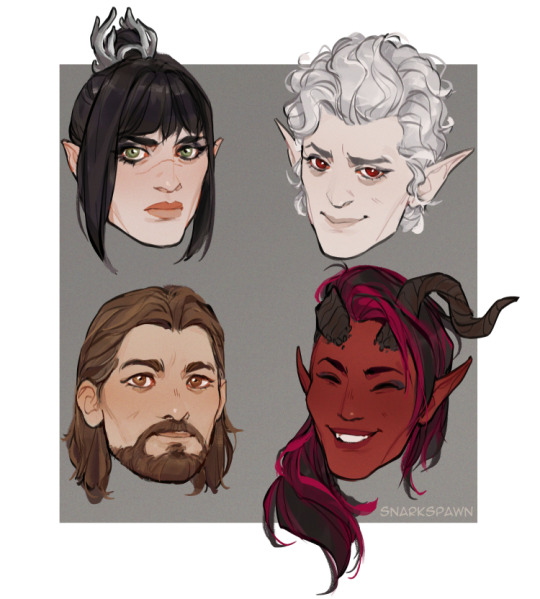
some floating heads of my boy Asher, his guardian and his favourite people to go adventuring with ♥
#baldur's gate 3#bg 3#bg 3 oc#tiefling#shadowheart#astarion#gale of waterdeep#karlach#dnd#elf#half elf#stuff and things#userpharawee#I doodled asher as a quick silly cooldown drawing and then just ... kind of felt like adding the rest#as for his party ... shadowheart and astarion are p much fixed lmao#and then I used to take gale but ever since I picked up karlach she kind of took over his spot#she's just so cool. I mean HOT obviously#but in a super cool way#I really wish you could take more than 3 companions because MAN I want to take them ALL. all the time
7K notes
·
View notes
Text
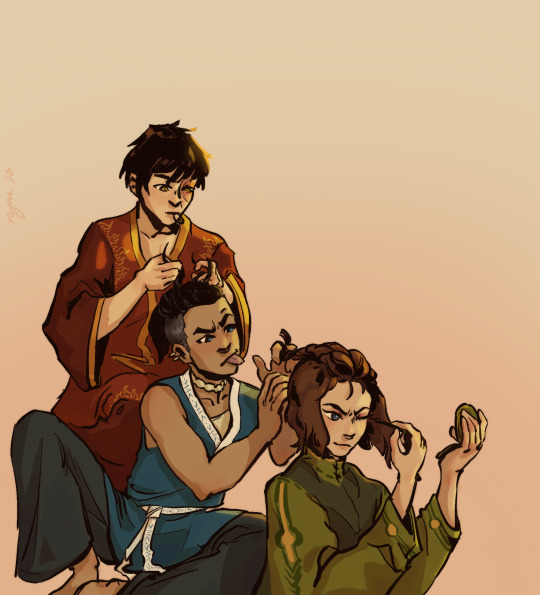
this year’s rewatch hittin hard
#i missed them so much#i relate to these three a lot more this year#unrelated but i also discovered they’re a ship and im kinda obsessed#this show means so much to me and it just gets better every time i watch it#atla fanart#zuko#atla sokka#atla suki#zukki fanart#my art <3
2K notes
·
View notes
Text
So I accidentally almost got into an argument on Twitter, and now I'm thinking about bad historical costuming tropes. Specifically, Action Hero Leather Pants.
See, I was light-heartedly pointing out the inaccuracies of the costumes in Black Sails, and someone came out of the woodwork to defend the show. The misunderstanding was that they thought I was dismissing the show just for its costumes, which I wasn't - I was simply pointing out that it can't entirely care about material history (meaning specifically physical objects/culture) if it treats its clothes like that.
But this person was slightly offended on behalf of their show - especially, quote, "And from a fan of OFMD, no less!" Which got me thinking - it's true! I can abide a lot more historical costuming inaccuracy from Our Flag than I can Black Sails or Vikings. And I don't think it's just because one has my blorbos in it. But really, when it comes down to it...
What is the difference between this and this?
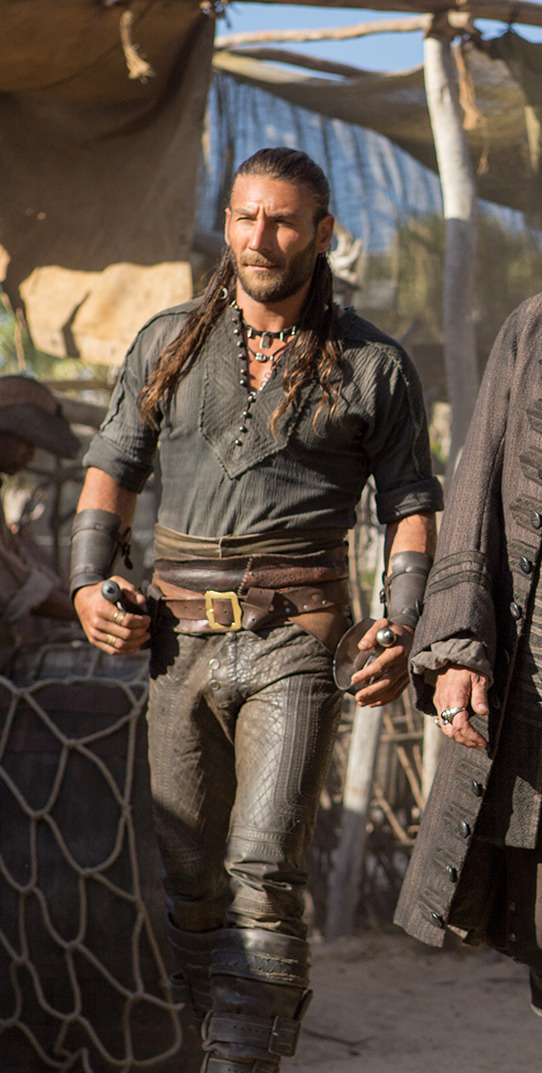
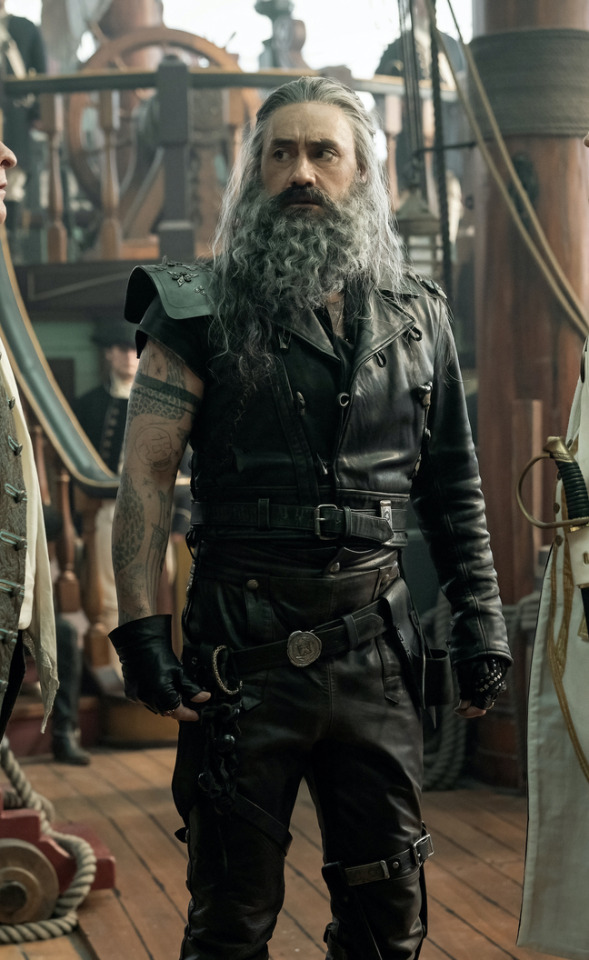
Here's the thing. Leather pants in period dramas isn't new. You've got your Vikings, Tudors, Outlander, Pirates of the Caribbean, Once Upon a Time, Will, The Musketeers, even Shakespeare in Love - they love to shove people in leather and call it a day. But where does this come from?
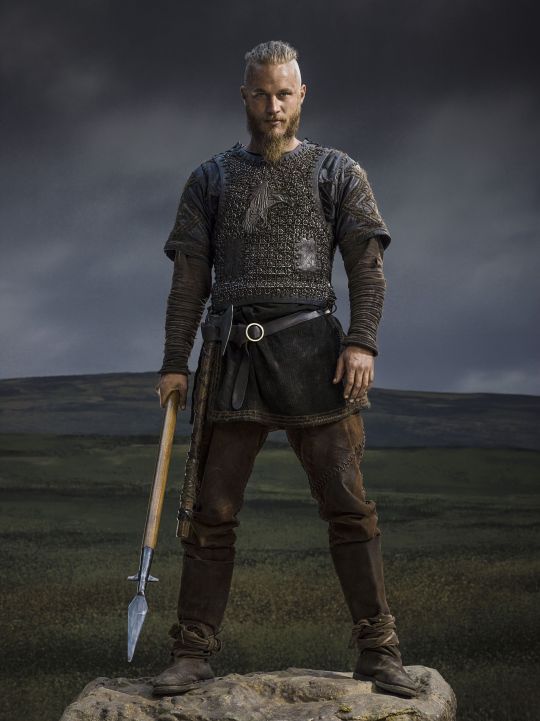
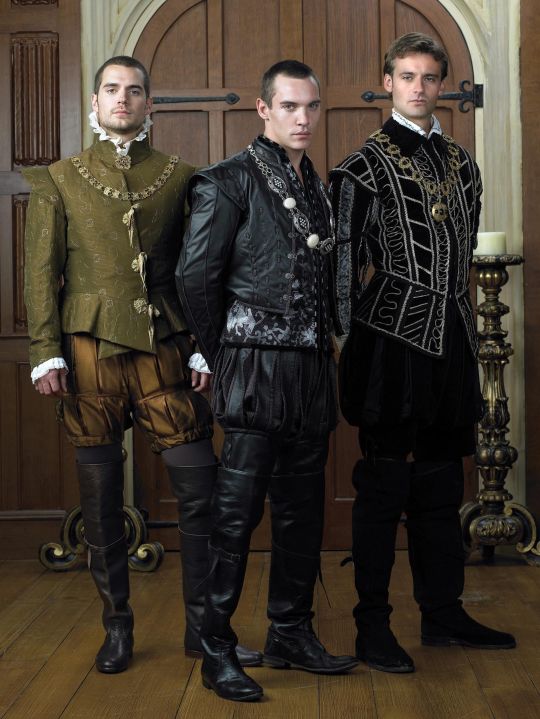
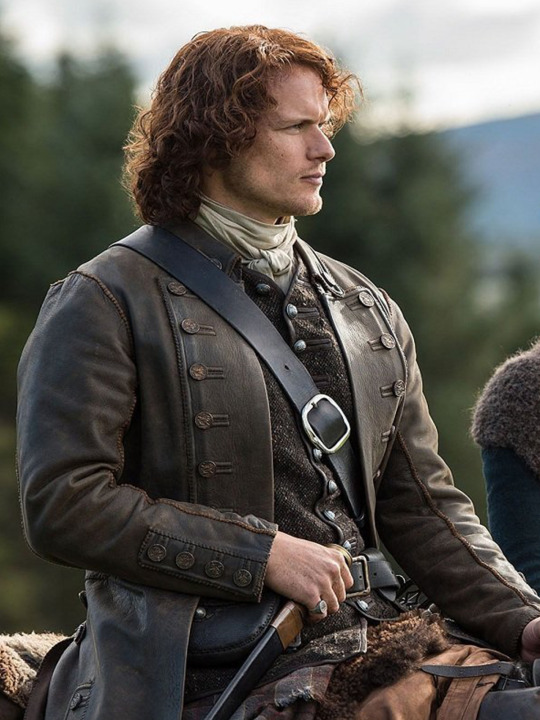

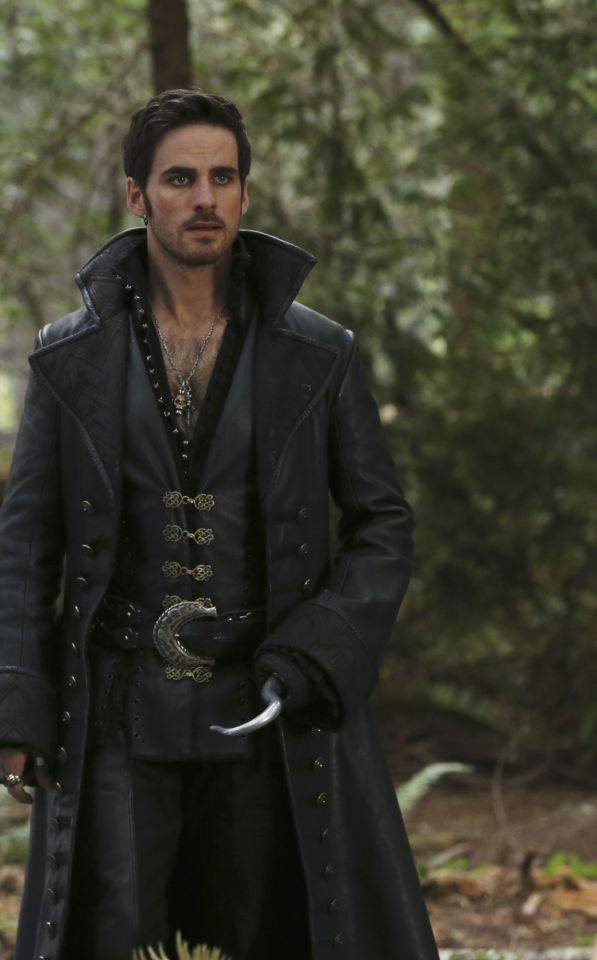
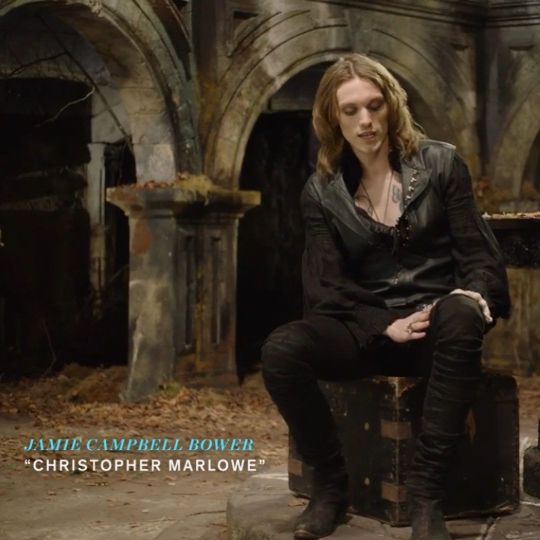
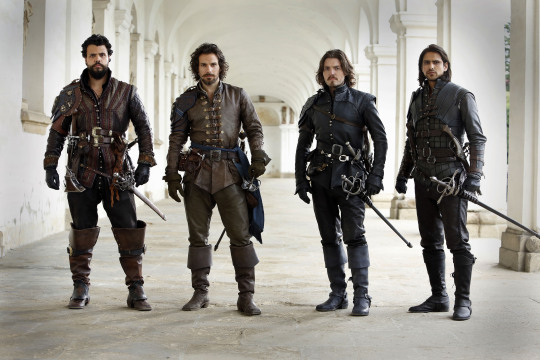
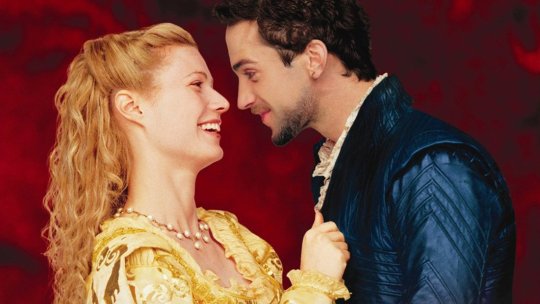
Obviously we have the modern connotations. Modern leather clothes developed in a few subcultures: cowboys drew on Native American clothing. (Allegedly. This is a little beyond my purview, I haven't seen any solid evidence, and it sounds like the kind of fact that people repeat a lot but is based on an assumption. I wouldn't know, though.) Leather was used in some WWI and II uniforms.
But the big boom came in the mid-C20th in motorcycle, punk/goth, and gay subcultures, all intertwined with each other and the above. Motorcyclists wear leather as practical protective gear, and it gets picked up by rock and punk artists as a symbol of counterculture, and transferred to movie designs. It gets wrapped up in gay and kink communities, with even more countercultural and taboo meanings. By the late C20th, leather has entered mainstream fashion, but it still carries those references to goths, punks, BDSM, and motorbike gangs, to James Dean, Marlon Brando, and Mick Jagger. This is whence we get our Spikes and Dave Listers in 1980s/90s media, bad boys and working-class punks.
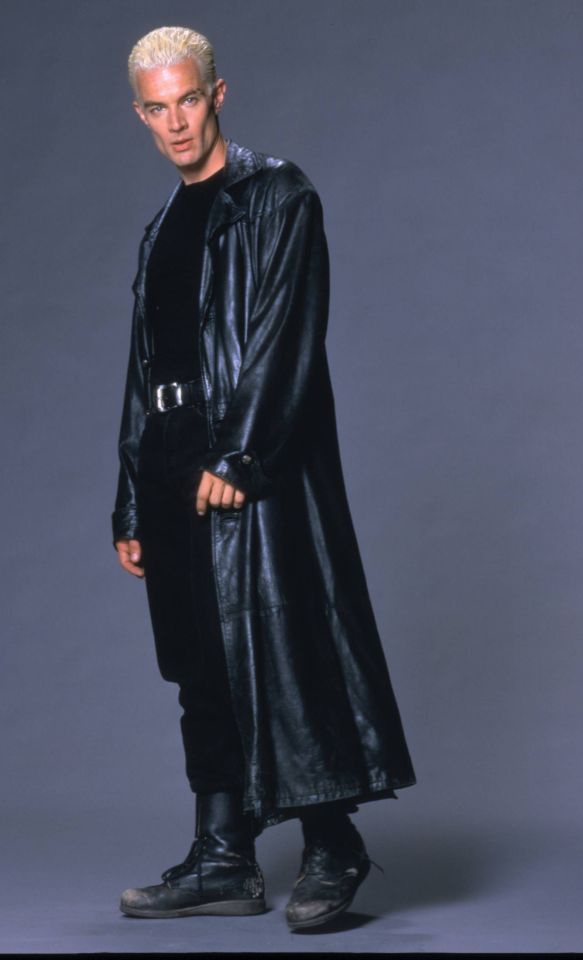
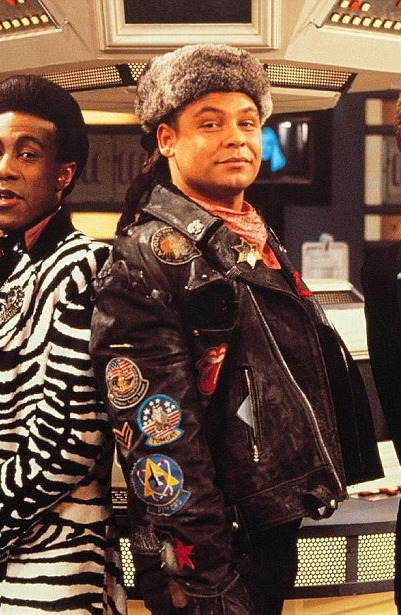
And some of the above "historical" design choices clearly build on these meanings. William Shakespeare is dressed in a black leather doublet to evoke the swaggering bad boy artist heartthrob, probably down on his luck. So is Kit Marlowe.
But the associations get a little fuzzier after that. Hook, with his eyeliner and jewellery, sure. King Henry, yeah, I see it. It's hideously ahistorical, but sure. But what about Jamie and Will and Ragnar, in their browns and shabby, battle-ready chic? Well, here we get the other strain of Bad Period Drama Leather.
See, designers like to point to history, but it's just not true. Leather armour, especially in the western/European world, is very, very rare, and not just because it decays faster than metal. (Yes, even in ancient Greece/Rome, despite many articles claiming that as the start of the leather armour trend!) It simply wasn't used a lot, because it's frankly useless at defending the body compared to metal. Leather was used as a backing for some splint armour pieces, and for belts, sheathes, and buckles, but it simply wasn't worn like the costumes above. It's heavy, uncomfortable, and hard to repair - it's simply not practical for a garment when you have perfectly comfortable, insulating, and widely available linen, wool, and cotton!
As far as I can see, the real influence on leather in period dramas is fantasy. Fantasy media has proliferated the idea of leather armour as the lightweight choice for rangers, elves, and rogues, a natural, quiet, flexible material, less flashy or restrictive than metal. And it is cheaper for a costume department to make, and easier for an actor to wear on set. It's in Dungeons and Dragons and Lord of the Rings, King Arthur, Runescape, and World of Warcraft.
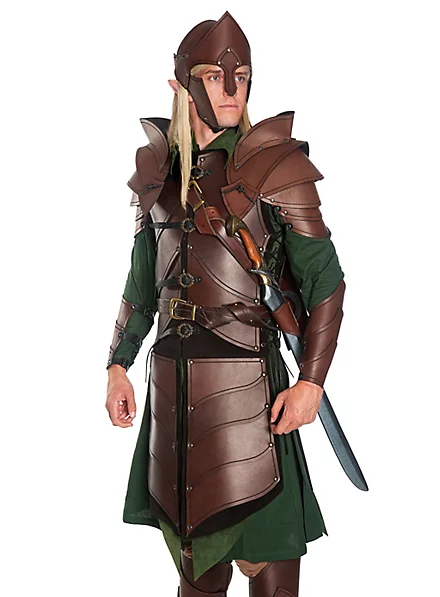
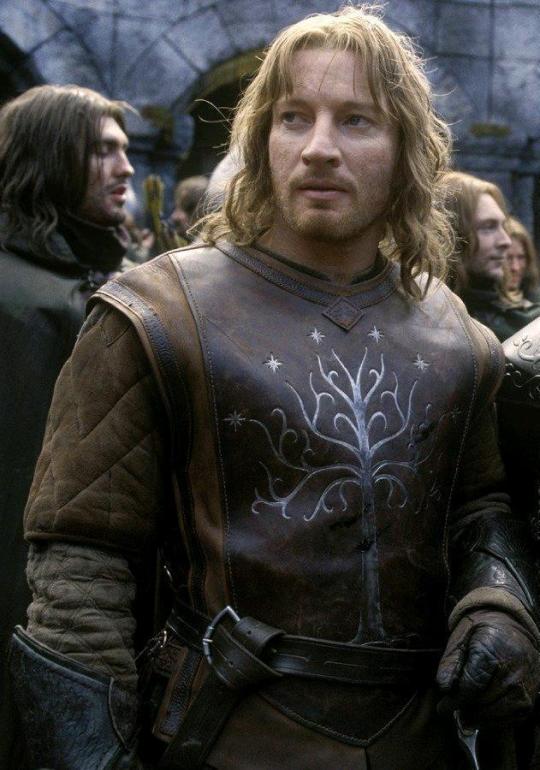
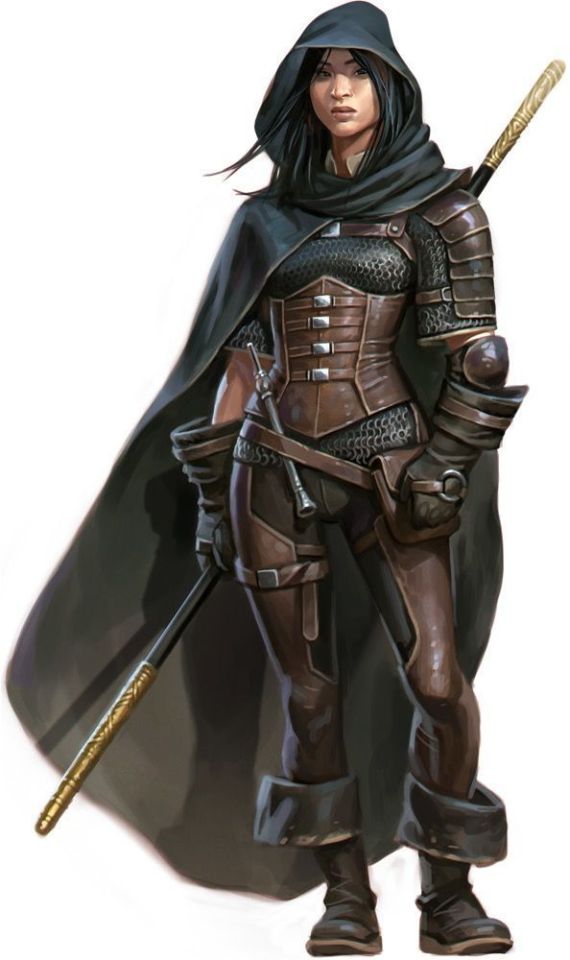
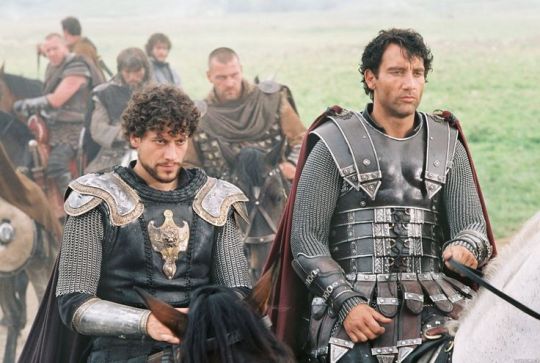

And I think this is how we get to characters like Ragnar and Vane. This idea of leather as practical gear and light armour, it's fantasy, but it has this lineage, behind which sits cowboy chaps and bomber/flight jackets. It's usually brown compared to the punk bad boy's black, less shiny, and more often piecemeal or decorated. In fact, there's a great distinction between the two Period Leather Modes within the same piece of media: Robin Hood (2006)! Compare the brooding, fascist-coded villain Guy of Gisborne with the shabby, bow-wielding, forest-dwelling Robin:
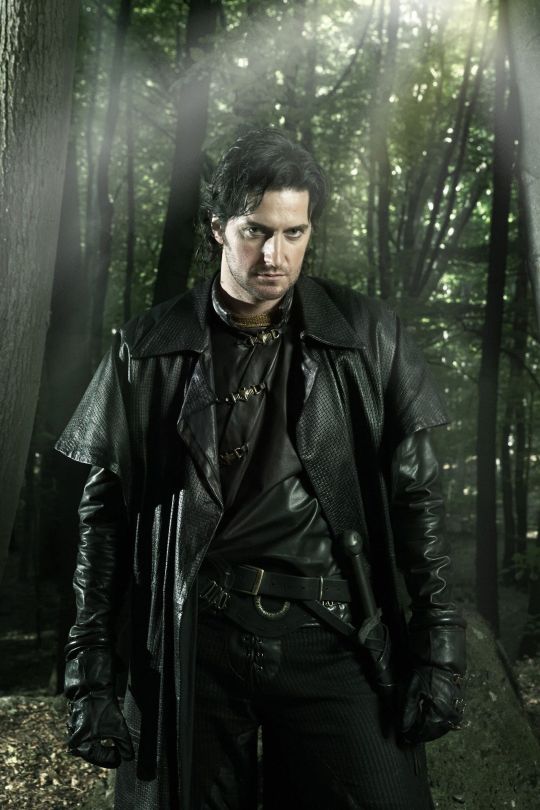
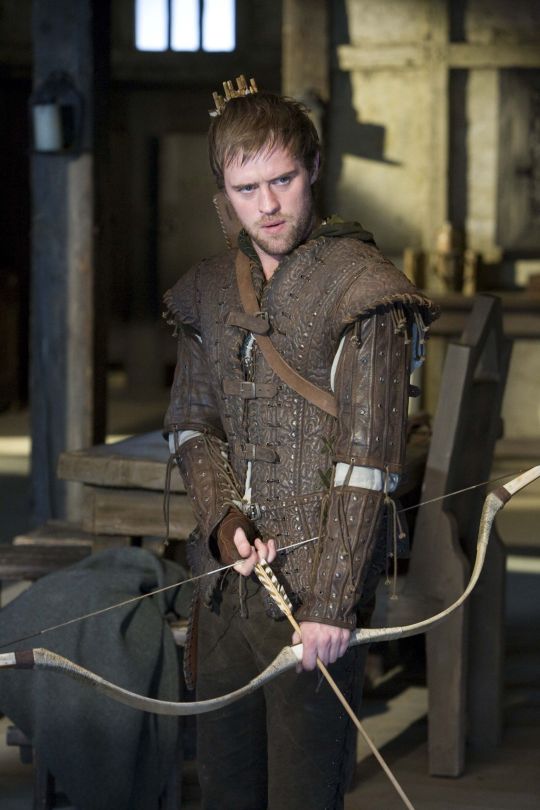
So, back to the original question: What's the difference between Charles Vane in Black Sails, and Edward Teach in Our Flag Means Death?
Simply put, it's intention. There is nothing intentional about Vane's leather in Black Sails. It's not the only leather in the show, and it only says what all shabby period leather says, relying on the same tropes as fantasy armour: he's a bad boy and a fighter in workaday leather, poor, flexible, and practical. None of these connotations are based in reality or history, and they've been done countless times before. It's boring design, neither historically accurate nor particularly creative, but much the same as all the other shabby chic fighters on our screens. He has a broad lineage in Lord of the Rings and Pirates of the Caribbean and such, but that's it.
In Our Flag, however, the lineage is much, much more intentional. Ed is a direct homage to Mad Max, the costuming in which is both practical (Max is an ex-cop and road warrior), and draws on punk and kink designs to evoke a counterculture gone mad to the point of social breakdown, exploiting the thrill of the taboo to frighten and titillate the audience.
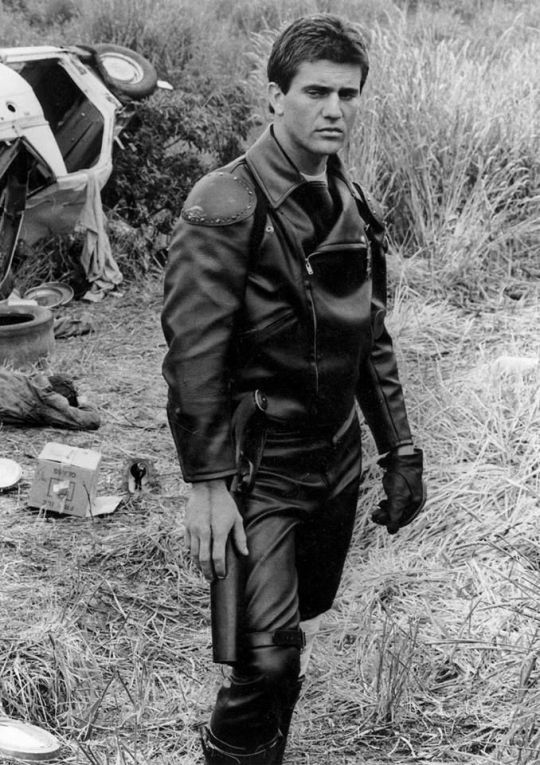
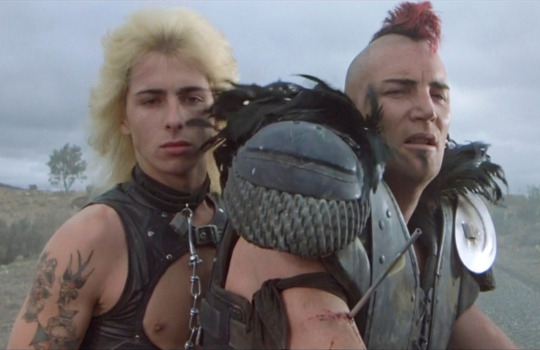
In particular, Ed is styled after Max in the second movie, having lost his family, been badly injured, and watched the world turn into an apocalypse. He's a broken man, withdrawn, violent, and deliberately cutting himself off from others to avoid getting hurt again. The plot of Mad Max 2 is him learning to open up and help others, making himself vulnerable to more loss, but more human in the process.
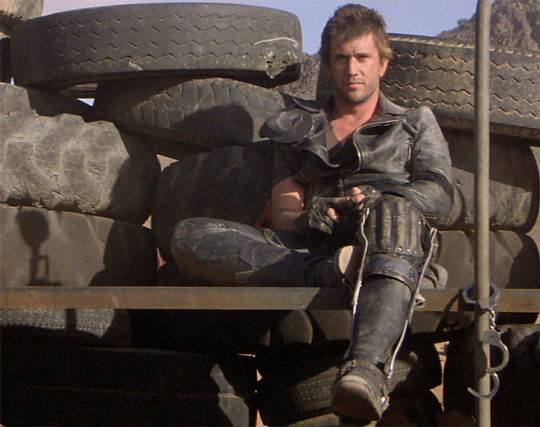
This ties directly into the themes of Our Flag - it's a deliberate intertext. Ed's emotional journey is also one from isolation and pain to vulnerability, community, and love. Mad Max (intentionally and unintentionally) explores themes of masculinity, violence, and power, while Max has become simplified in the popular imagination as a stoic, badass action hero rather than the more complex character he is, struggling with loss and humanity. Similarly, Our Flag explores masculinity, both textually (Stede is trying to build a less abusive pirate culture) and metatextually (the show champions complex, banal, and tender masculinities, especially when we're used to only seeing pirates in either gritty action movies or childish comedies).
Our Flag also draws on the specific countercultures of motorcycles, rockers, and gay/BDSM culture in its design and themes. Naturally, in such a queer show, one can't help but make the connection between leather pirates and leather daddies, and the design certainly nods at this, with its vests and studs. I always think about this guy, with his flat cap so reminiscient of gay leather fashions.
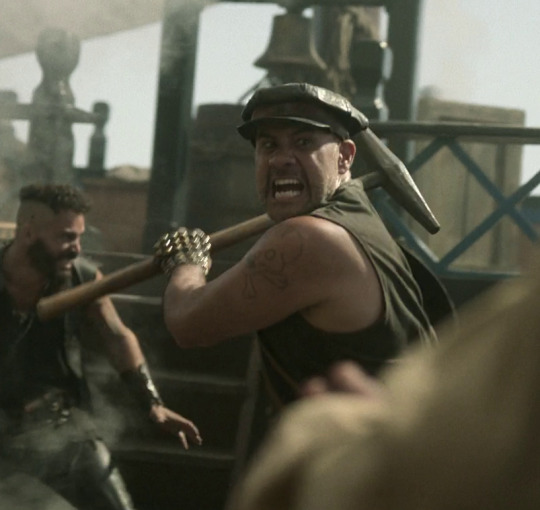
More overtly, though, Blackbeard and his crew are styled as both violent gangsters and countercultural rockstars. They rove the seas like a bikie gang, free and violent, and are seen as icons, bad boys and celebrities. Other pirates revere Blackbeard and wish they could be on his crew, while civilians are awed by his reputation, desperate for juicy, gory details.
This isn't all of why I like the costuming in Our Flag Means Death (especially season 1). Stede's outfits are by no means accurate, but they're a lot more accurate than most pirate media, and they're bright and colourful, with accurate and delightful silks, lace, velvets, and brocades, and lovely, puffy skirts on his jackets. Many of the Revenge crew wear recognisable sailor's trousers, and practical but bright, varied gear that easily conveys personality and flair. There is a surprising dedication to little details, like changing Ed's trousers to fall-fronts for a historical feel, Izzy's puffy sleeves, the handmade fringe on Lucius's red jacket, or the increasing absurdity of navy uniform cuffs between Nigel and Chauncey.
A really big one is the fact that they don't shy away from historical footwear! In almost every example above, we see the period drama's obsession with putting men in skinny jeans and bucket-top boots, but not only does Stede wear his little red-heeled shoes with stockings, but most of his crew, and the ordinary people of Barbados, wear low boots or pumps, and even rough, masculine characters like Pete wear knee breeches and bright colours. It's inaccurate, but at least it's a new kind of inaccuracy, that builds much more on actual historical fashions, and eschews the shortcuts of other, grittier period dramas in favour of colour and personality.
But also. At least it fucking says something with its leather.
#everyone say 'thank you togas' for not including a long tangent about evil rimmer in red dwarf 5x05#Our Flag Means Death#Togas does meta#and yes these principles DO fall apart slightly in s2 and i DON'T like those costumes as much#don't get me wrong they're fun and gorgeous - but generally a bit less deep and more inaccurate. so. :(#I'm not sure this really says anything new about Our Flag but I just needed to get my thoughts out#i hate hate hate Gritty Period Drama costumes they're so boring and so ugly and so wrong#god bless OFMD for using more than 3 muted colours and actually putting men in heels (and not as a shorthand for rich/foppish villainy) <3#looking at that Tudors still is insane like they really will go to any lengths to not make men feel like they've got bare legs XD#image descriptions in alt text#and yes i DID just sink about two hours into those so you'd better appreciate them
1K notes
·
View notes